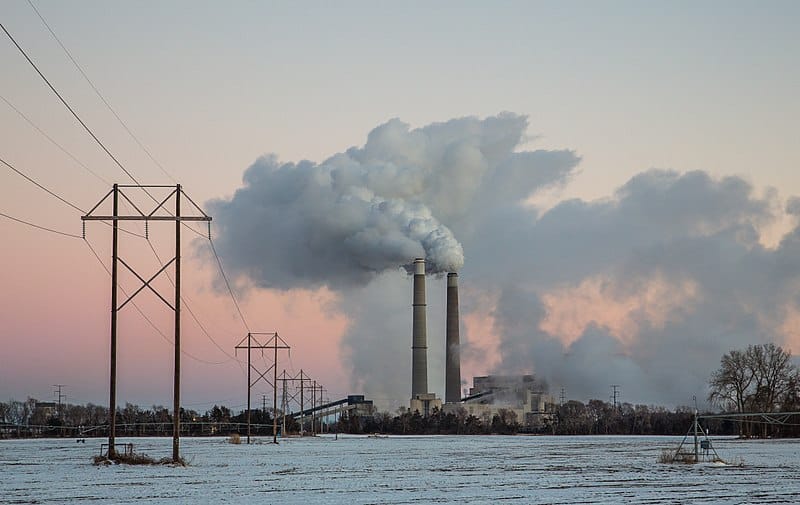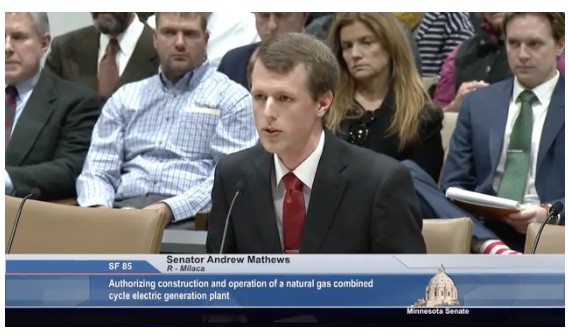Legislation Advances to Allow Xcel Energy to Build Natural Gas Plant that Bypasses Usual Regulatory Review

On February 2, the Minnesota Senate Committee on Energy and Utilities Finance and Policy voted 7-2 in favor of giving Xcel Energy the certainty to build a 780-megawatt natural gas power plant. The new gas units will replace two coal-fired electric generating units at the Sherburne County plant, otherwise known as Sherco, in Becker, that are set for retirement in 2023 and 2026.
If the bill, S.F. 85, is approved and signed by the governor, Xcel Energy and the legislators with whom it worked will have set a precedent by allowing a monopoly utility to construct, own, and operate a power plant without obtaining a Certificate of Need from the state Public Utilities Commission (PUC). The certificate of need process requires a utility company to demonstrate with forecasting models that its proposal is the lowest-cost and best way to meet the utility’s energy needs. Other utilities in the state, Allete’s Minnesota Power or Otter Tail Corporation, could follow suit when their coal units are set for retirement and lobby to have them become natural gas plants without obtaining the PUC’s certificate of need.
In October 2015, Xcel announced in a plan filed with the PUC that it is going to retire the two oldest coal units at Sherco, and build a combined-cycle natural gas generating unit on adjacent land. After the announcement, Gov. Mark Dayton said Xcel’s proposal will be fully reviewed by state regulators and subject to “rigorous public comment and consideration.” On January 11, 2017, the PUC – after over a year of issuing orders, analyzing Xcel’s resource plans and forecast models, and holding discussions with the utility and stakeholders – issued an order that said (emphasis added),
The Commission is persuaded by the argument that, given the Sherco retirement dates of 2023 and 2026, it is premature at this time to determine with specificity the fuel type and location to address the identified 750 MW capacity need. The Commission is not persuaded that alternatives to the reliability concerns raised by Xcel have been fully considered…
The PUC authorized a Certificate of Need process to evaluate this anticipated need because, as the regulators stated in their order, “the certificate of need process will also be based on a more precise and contemporaneous forecast.”
 Less than a month after the PUC issued their order, legislation backed by Xcel quickly advanced in both the Senate and House committees in a clear effort to end-run the Commission’s authority. Vice Chair of the Senate Energy and Utilities Finance and Policy Committee Andrew Mathews (R-Milaca), whose district includes the plant, said, “We’re not going around the PUC. We are completing the process left unfinished.”
Less than a month after the PUC issued their order, legislation backed by Xcel quickly advanced in both the Senate and House committees in a clear effort to end-run the Commission’s authority. Vice Chair of the Senate Energy and Utilities Finance and Policy Committee Andrew Mathews (R-Milaca), whose district includes the plant, said, “We’re not going around the PUC. We are completing the process left unfinished.”
In an effort to win over clean energy advocates and environmentalists during committee hearings, Xcel and its supporters were quick to argue that natural gas is clean, its emissions are decreasing, and it supports renewables. However, climate scientists are increasingly concerned that if utility companies continue their rapid rush to build natural gas plants, the U.S. will not be able to meet its climate goals under the Paris Climate Accord. Additionally, the natural gas delivered to these plants is a result of fracking from a variety of basins, including those in Colorado, Texas, and Oklahoma. Many studies have concluded that fracking impacts drinking water resources, emits methane – dozens of times more potent as a greenhouse gas than carbon dioxide, and the injection of oil and gas wastewater causes earthquakes.
Despite the precedent Xcel Energy is set to create, consumer advocates in the state were able to amend this bill and win important provisions. According to the Minnesota Citizens Utility Board (CUB), “The amendment affirms the PUC’s prerogative to approve only the costs that are ‘reasonable and prudent,’ and it provides a basis for determining what those reasonable and prudent costs are… While CUB does not support legislating the construction of a new power plant, we were able to win important provisions that should help protect consumers in this instance.”
It is unclear how the PUC has reacted to the proposed bypass. As a quasi-judicial body, it does not support or oppose pieces of legislation, a PUC spokesperson told the Energy and Policy Institute. But it does provide testimony in committees if asked. With regards to the bills in the House and Senate that pertain to the Sherco units and the proposed gas plant, the PUC spokesperson confirmed that it was not asked to offer testimony.
According to testimony offered by Xcel Energy at the hearing, the commissioners’ next opportunity to review the utility’s energy plans, including the natural gas plant at Sherco, will be in 2019 when it files its integrated resource plan (IRP). Four of the five commissioners will still be serving their appointed terms when the IRP is filed; Commissioner Nancy Lange’s term will expire on January 7, 2019.
Recently, the PUC has advanced renewable energy policies. In July 2016, the PUC voted 5-0 to implement the value of solar rate for solar garden applications filed after December 31, 2016. The value of solar calculation was first approved by the PUC in 2014. In June 2016, the PUC unanimously approved Minnesota Power’s IRP with modifications that included 100-300 MW of bidding for wind energy, up to 100 MW of additional solar by 2022, and also did not presume natural gas replacement for retiring coal units.
S.F. 85 is not the only piece of legislation advancing in the legislature. Other bills have been introduced that strip the PUC’s ability to review complaints made by rural electric cooperative (co-op) customers that are charged new fees when they install solar panels. Other bills change the PUC permitting process of pipelines, and also change the makeup of the PUC itself. Briana Bierschbach of the MinnPost has a detailed rundown of the bills.
Photo: Wikipedia Commons, Tony Webster



